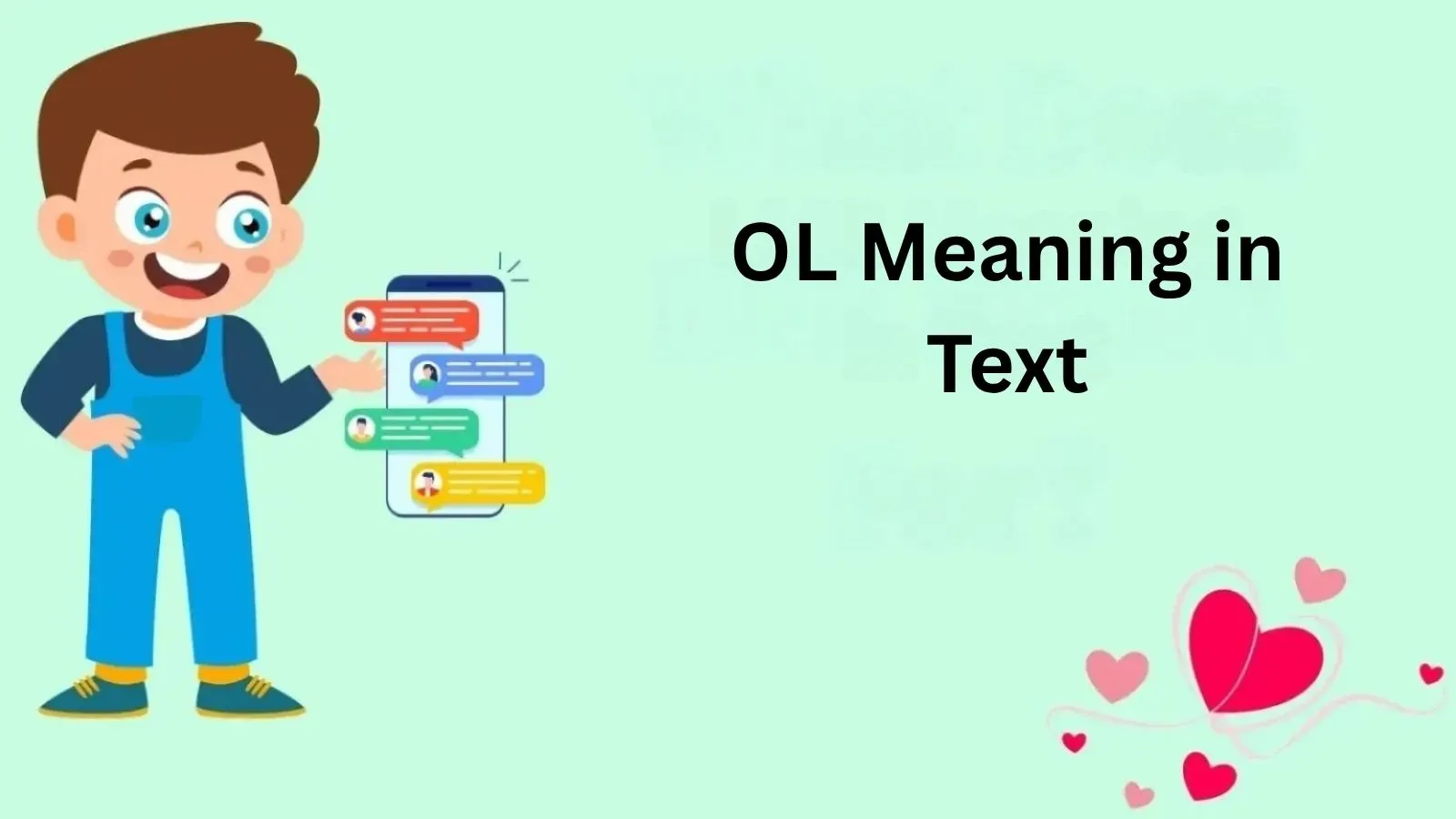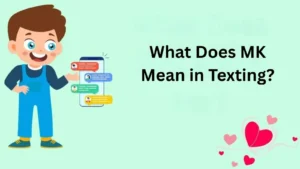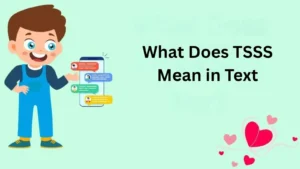Texting is a big part of how we talk today. From quick chats with friends to posts on social media, we use short words and slang to save time. One term you might see is “ol.” It pops up in texts, gaming chats, and even on platforms like Twitter or Tinder.
But what does it mean? Why should you care? Understanding “ol” helps you keep up with conversations and avoid confusion. Whether you’re texting a friend, gaming online, or messaging on a dating app, knowing this term makes you sound in-the-know.
Plus, it’s fun to learn the slang that shapes our digital world. In this post, we’ll dive into the meaning of “ol,” its history, and how to use it right. Let’s get started and decode this tiny but mighty term!
Definition & Meaning
“Ol” means “old” in texting and online chats. It’s a shorthand way to describe something or someone that’s been around for a while. People use it to sound casual or cool, especially in quick messages. It’s not an acronym but a shortened version of “old,” often used for humor or emphasis.
Examples of “ol” in use:
- To describe an outdated thing: “That phone is ol, get a new one!”
- To jokingly refer to a person: “My ol buddy from school is coming over.”
- To emphasize age or time: “This ol game still slaps!”
It’s versatile but informal. You’ll see it in texts, social media posts, or gaming chats. It’s not meant to be rude but can sound cheeky depending on the context. For instance, calling someone “my ol pal” is friendly, while “that ol thing” might suggest something’s outdated.
Dialogue example:
- Alex: “You still got that ol laptop from 2015?”
- Jamie: “Yup, my ol trusty still works!”
Background & History
The term “ol” comes from informal English speech. It’s a shortened form of “old,” rooted in casual language where people drop letters for speed or style. This kind of slang has been around for decades, especially in dialects like African American Vernacular English (AAVE) or Southern U.S. English, where dropping the “d” in “old” is common.
It gained traction in the digital age. As texting and online chats grew in the 2000s, people needed quick ways to type. Short forms like “ol” became popular, especially in early internet forums and SMS. Social media and gaming boosted its use.
Platforms like Twitter, with character limits, made short slang like “ol” perfect for quick posts. Today, it’s common in casual online spaces, from Reddit to Discord, and even in everyday texts among friends.
It’s not tied to one group or place. While it may have roots in specific dialects, “ol” is now used globally in informal English chats.
Usage in Various Contexts
“Ol” fits in many casual settings. It’s used in texting, social media, gaming, and everyday chats. Here’s how it shows up:
Texting:
- Friends use it to sound playful or nostalgic.
- Example:
- Sam: “You still rocking that ol hoodie?”
- Riley: “Heck yeah, it’s my ol favorite!”
Social Media:
- On Twitter or TikTok, “ol” adds a casual vibe to posts.
- Example:
- Post: “Just found my ol playlist from 2010, what a vibe!”
- Comment: “Lol, those ol songs hit different.”
Gaming:
- Gamers use it to describe old games, gear, or players.
- Example:
- Player 1: “You still play that ol shooter?”
- Player 2: “Yeah, ol games are the best!”
Casual Conversations:
- It’s common in friendly chats to describe familiar or outdated things.
- Example:
- Mia: “This ol café still has the best coffee.”
- Liam: “Totally, ol spots are unbeatable.”
It’s not formal. You won’t see “ol” in emails or professional chats, but it’s perfect for laid-back moments.
Common Misconceptions & Clarifications
“Ol” doesn’t always mean literally old. Some think it only describes age, but it’s often about familiarity or nostalgia. For example, “my ol friend” doesn’t mean your friend is elderly—it means you’ve known them a while.
It’s not an acronym. Unlike LOL or OMG, “ol” is just a short form of “old.” People sometimes guess it stands for something else, but it doesn’t.
It can sound rude if misused. Calling someone “that ol guy” in a negative tone might offend, especially if they’re sensitive about age. Context matters. In a friendly chat, it’s fine, but in a formal or sensitive setting, it might seem dismissive.
It’s not universal. Some non-native English speakers might not get it, assuming it’s a typo or a different word. Always consider your audience before using it.
Clarification example:
- Wrong: “That ol lady was slow at the store.” (Sounds rude.)
- Right: “My ol buddy helped me move.” (Sounds friendly.)
Similar Terms & Alternatives
Other slang terms can replace “ol.” Here are some alternatives and how they compare:
- Old-school: Means retro or classic, often positive.
- Example: “That old-school game is dope.”
- OG: Stands for “original gangster,” meaning authentic or long-time.
- Example: “She’s an OG in the music scene.”
- Vintage: Suggests something old but valuable.
- Example: “This vintage shirt is so cool.”
- Classic: Implies timeless quality.
- Example: “That’s a classic ol car.”
Comparison Table:
| Term | Meaning | Tone | Example |
| Ol | Old, familiar, or outdated | Casual, fun | My ol phone still works. |
| Old-school | Retro, nostalgic | Positive | Love that old-school vibe. |
| OG | Original, authentic | Respectful | He’s an OG in gaming. |
| Vintage | Old but valuable | Appreciative | Got a vintage ol jacket. |
Use depends on vibe. “Ol” is more casual than “vintage” but less formal than “classic.”
How to Respond to This Term
Responding to “ol” depends on the mood. Here are different styles with examples:
Casual Response:
- Keep it light and match the vibe.
- Example:
- Friend: “You still got that ol bike?”
- You: “Yup, my ol ride’s still kicking!”
Funny Response:
- Add humor to keep it playful.
- Example:
- Friend: “That ol game you play is ancient!”
- You: “Hey, my ol game’s older than your jokes!”
Professional Response:
- Avoid slang and keep it polite.
- Example:
- Colleague: “You using that ol software?”
- You: “Yes, it’s still reliable for now.”
Privacy-Conscious Response:
- Stay vague if you don’t want to share.
- Example:
- Friend: “You still with that ol phone?”
- You: “Haha, something like that.”
Tip: Mirror the sender’s tone. If they’re joking, joke back. If they’re serious, keep it neutral.
Regional or Cultural Differences
“Ol” is mainly an English slang term. It’s widely used in the U.S., U.K., Canada, and other English-speaking places. Its roots in informal dialects like AAVE or Southern U.S. English give it a cultural flavor, but it’s now global thanks to the internet.
Regional variations exist:
- In the U.S., “ol” is common in casual speech, especially in the South or urban areas.
- In the U.K., it’s less common but understood in online spaces.
- In Australia, terms like “old mate” are similar but more common.
Non-English cultures might not use it. In languages like Spanish or French, direct translations don’t exist, but similar slang (like “vieux” in French for “old”) might be used. It’s big in online English communities. Gamers, TikTokers, and Twitter users worldwide use “ol” in English posts, even if their first language differs.
Example:
- U.S.: “My ol car broke down again.”
- U.K.: “That’s an ol tune, mate.”
Comparison with Similar Terms
“Ol” vs. similar terms: Here’s a detailed comparison:
| Term | Meaning | Context | Formality | Example |
| Ol | Old, familiar, or outdated | Texting, gaming, casual | Informal | My ol phone’s still good. |
| Old-school | Retro, nostalgic | Music, fashion, gaming | Informal | That old-school rap slaps. |
| OG | Original, authentic | Respectful, often for people | Informal | She’s an OG in this crew. |
| Vintage | Old but valuable | Fashion, collectibles | Neutral | Got a vintage ol watch. |
| Ancient | Very old, often exaggerated | Joking, critical | Informal | That’s an ancient ol PC. |
Key differences:
- “Ol” is shorter and more versatile. It fits in quick texts.
- “OG” is about respect or authenticity. It’s not just about age.
- “Ancient” can sound negative. It implies something’s too old.
Usage in Online Communities & Dating Apps
“Ol” is popular online. It’s used on platforms like Twitter, TikTok, Discord, and dating apps like Tinder to sound casual or nostalgic.
Twitter/TikTok:
- Users add “ol” to posts for humor or relatability.
- Example: “Just saw my ol crush on TikTok, lol.”
Gaming Communities:
- Common in Discord or Twitch chats to describe old games or players.
- Example:
- Gamer: “You play that ol RPG?”
- Reply: “Yeah, it’s an ol classic!”
Dating Apps:
- On Tinder, “ol” can make messages playful.
- Example:
- Match: “You still into that ol band?”
- You: “Heck yeah, my ol faves never die!”
Tips for responding:
- Keep it light and match their tone.
- Avoid overusing slang if the vibe feels formal.
- Example:
- Match: “Got any ol hobbies?”
- You: “Yup, still love my ol guitar jams!”
Hidden or Offensive Meanings
“Ol” is usually harmless. It’s a neutral term for “old,” but context matters. It can sound rude if used carelessly. For example, calling someone “that ol guy” in a negative tone might seem disrespectful, especially if they’re sensitive about age.
No hidden meanings. Unlike some slang, “ol” doesn’t have secret or offensive undertones. It’s just a casual shortcut. Tone matters. A friendly “my ol pal” is fine, but “that ol thing” about someone’s prized possession might upset them.
Example of misuse:
- Bad: “That ol teacher was so slow.” (Sounds mean.)
- Good: “My ol teacher was the best!” (Sounds warm.)
Be mindful of the setting. In professional or sensitive contexts, avoid “ol” to prevent sounding dismissive.
Suitability for Professional Communication
“Ol” is not suited for professional settings. It’s too informal for emails, reports, or workplace chats. Using it in a formal context might make you seem unprofessional or careless.
When to avoid it:
- In work emails: Stick to “old” or “previous.”
- In meetings: Use formal terms like “existing” or “prior.”
- Example:
- Unprofessional: “That ol system needs an update.”
- Professional: “The existing system needs an update.”
Alternatives for professional use:
- Previous: “The previous version worked well.”
- Existing: “Our existing tools are reliable.”
- Former: “The former manager approved it.”
Exception: If your workplace is very casual (like a startup), “ol” might be okay in team chats, but use it sparingly.
FAQs
1. What does “ol” mean in texting?
It’s a shorthand for “old,” used to describe something or someone familiar, outdated, or nostalgic.
2. Is “ol” rude?
Not usually, but it can sound rude if used negatively, like “that ol guy.” Context matters.
3. Can I use “ol” in professional emails?
No, it’s too informal. Use “old,” “previous,” or “existing” instead.
4. Where did “ol” come from?
It comes from informal English, like AAVE or Southern dialects, and grew popular in texting and online chats.
5. Is “ol” used outside the U.S.?
Yes, it’s common in English-speaking online spaces globally, but less so in non-English cultures.
6. How do I respond to “ol” in a text?
Match the tone—casual, funny, or neutral. For example, “Yup, my ol phone’s still good!”
Conclusion
“Ol” is a small word with big personality. It’s a fun, casual way to say “old” in texts, social media, and gaming chats. From joking about an old phone to calling someone your “ol pal,” it adds a playful vibe to conversations. Knowing when and how to use it is key.
It’s great for informal chats but not for professional settings. By understanding its roots, uses, and potential pitfalls, you can use “ol” confidently and avoid missteps.
Whether you’re texting friends, posting on Twitter, or chatting on Tinder, this little term helps you sound in-the-know. So, next time you see “ol” pop up, you’ll know exactly what it means and how to respond!



